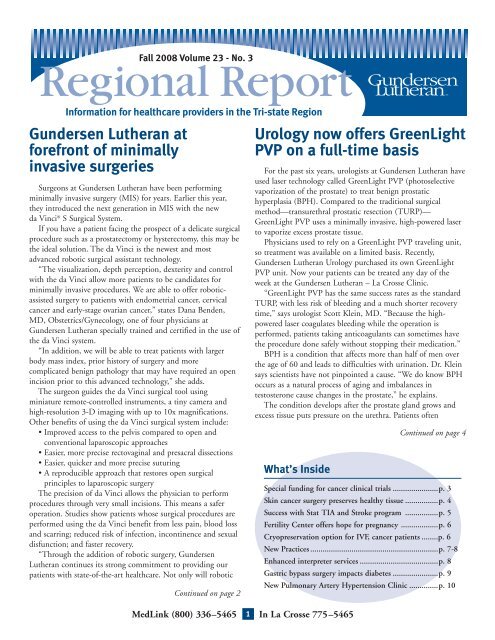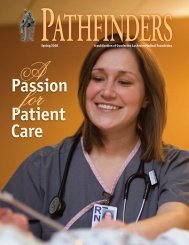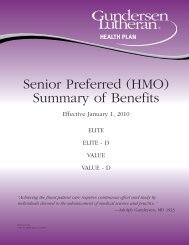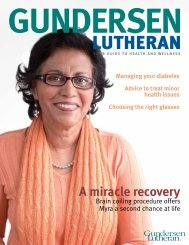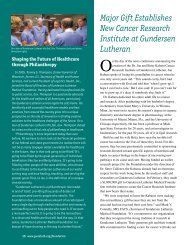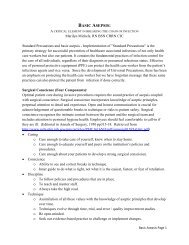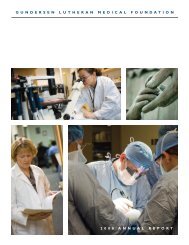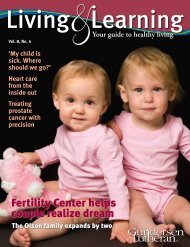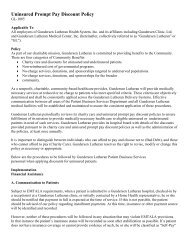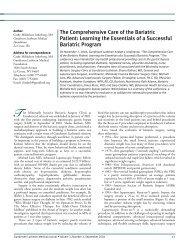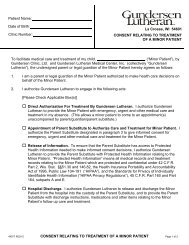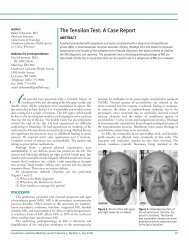Regional Report - Gundersen Health System
Regional Report - Gundersen Health System
Regional Report - Gundersen Health System
Create successful ePaper yourself
Turn your PDF publications into a flip-book with our unique Google optimized e-Paper software.
Fall 2008 Volume 23 - No. 3<br />
<strong>Regional</strong> <strong>Report</strong><br />
Information for healthcare providers in the Tri-state Region<br />
<strong>Gundersen</strong> Lutheran at<br />
forefront of minimally<br />
invasive surgeries<br />
Surgeons at <strong>Gundersen</strong> Lutheran have been performing<br />
minimally invasive surgery (MIS) for years. Earlier this year,<br />
they introduced the next generation in MIS with the new<br />
da Vinci ® S Surgical <strong>System</strong>.<br />
If you have a patient facing the prospect of a delicate surgical<br />
procedure such as a prostatectomy or hysterectomy, this may be<br />
the ideal solution. The da Vinci is the newest and most<br />
advanced robotic surgical assistant technology.<br />
“The visualization, depth perception, dexterity and control<br />
with the da Vinci allow more patients to be candidates for<br />
minimally invasive procedures. We are able to offer roboticassisted<br />
surgery to patients with endometrial cancer, cervical<br />
cancer and early-stage ovarian cancer,” states Dana Benden,<br />
MD, Obstetrics/Gynecology, one of four physicians at<br />
<strong>Gundersen</strong> Lutheran specially trained and certified in the use of<br />
the da Vinci system.<br />
“In addition, we will be able to treat patients with larger<br />
body mass index, prior history of surgery and more<br />
complicated benign pathology that may have required an open<br />
incision prior to this advanced technology,” she adds.<br />
The surgeon guides the da Vinci surgical tool using<br />
miniature remote-controlled instruments, a tiny camera and<br />
high-resolution 3-D imaging with up to 10x magnifications.<br />
Other benefits of using the da Vinci surgical system include:<br />
• Improved access to the pelvis compared to open and<br />
conventional laparoscopic approaches<br />
• Easier, more precise rectovaginal and presacral dissections<br />
• Easier, quicker and more precise suturing<br />
• A reproducible approach that restores open surgical<br />
principles to laparoscopic surgery<br />
The precision of da Vinci allows the physician to perform<br />
procedures through very small incisions. This means a safer<br />
operation. Studies show patients whose surgical procedures are<br />
performed using the da Vinci benefit from less pain, blood loss<br />
and scarring; reduced risk of infection, incontinence and sexual<br />
disfunction; and faster recovery.<br />
“Through the addition of robotic surgery, <strong>Gundersen</strong><br />
Lutheran continues its strong commitment to providing our<br />
patients with state-of-the-art healthcare. Not only will robotic<br />
Continued on page 2<br />
Urology now offers GreenLight<br />
PVP on a full-time basis<br />
For the past six years, urologists at <strong>Gundersen</strong> Lutheran have<br />
used laser technology called GreenLight PVP (photoselective<br />
vaporization of the prostate) to treat benign prostatic<br />
hyperplasia (BPH). Compared to the traditional surgical<br />
method—transurethral prostatic resection (TURP)—<br />
GreenLight PVP uses a minimally invasive, high-powered laser<br />
to vaporize excess prostate tissue.<br />
Physicians used to rely on a GreenLight PVP traveling unit,<br />
so treatment was available on a limited basis. Recently,<br />
<strong>Gundersen</strong> Lutheran Urology purchased its own GreenLight<br />
PVP unit. Now your patients can be treated any day of the<br />
week at the <strong>Gundersen</strong> Lutheran – La Crosse Clinic.<br />
“GreenLight PVP has the same success rates as the standard<br />
TURP, with less risk of bleeding and a much shorter recovery<br />
time,” says urologist Scott Klein, MD. “Because the highpowered<br />
laser coagulates bleeding while the operation is<br />
performed, patients taking anticoagulants can sometimes have<br />
the procedure done safely without stopping their medication.”<br />
BPH is a condition that affects more than half of men over<br />
the age of 60 and leads to difficulties with urination. Dr. Klein<br />
says scientists have not pinpointed a cause. “We do know BPH<br />
occurs as a natural process of aging and imbalances in<br />
testosterone cause changes in the prostate,” he explains.<br />
The condition develops after the prostate gland grows and<br />
excess tissue puts pressure on the urethra. Patients often<br />
What’s Inside<br />
Continued on page 4<br />
Special funding for cancer clinical trials ......................p. 3<br />
Skin cancer surgery preserves healthy tissue ................p. 4<br />
Success with Stat TIA and Stroke program ................p. 5<br />
Fertility Center offers hope for pregnancy ..................p. 6<br />
Cryopreservation option for IVF, cancer patients ........p. 6<br />
New Practices ..............................................................p. 7-8<br />
Enhanced interpreter services ......................................p. 8<br />
Gastric bypass surgery impacts diabetes ......................p. 9<br />
New Pulmonary Artery Hypertension Clinic ..............p. 10<br />
MedLink (800) 336–5465 1 In La Crosse 775–5465
Minimally invasive surgeries – continued<br />
surgery allow us to perform more minimally invasive<br />
procedures, but our patients will benefit with a shorter hospital<br />
stay and quicker return to normal daily activities,” adds<br />
urologist Chris Hofland, MD, who also performs procedures<br />
using the da Vinci.<br />
Currently, the <strong>Gundersen</strong> Lutheran physicians show at right<br />
are using the da Vinci Surgical <strong>System</strong>. If you have a patient<br />
who might benefit from this technology, contact one of these<br />
physicians via MedLink.<br />
Dana Benden, MD<br />
Specialty: Obstetrics & Gynecology<br />
MD Degree: University of Wisconsin Medical College,<br />
Madison<br />
Residency: Illinois Masonic Medical Center, Chicago<br />
Chris Hofland, MD<br />
Specialty: Urology<br />
MD Degree: University of Wisconsin – Madison<br />
Internship: William Beaumont Army Medical Center,<br />
El Paso, Texas<br />
Residency: Tripler <strong>Regional</strong> Medical Center, Honolulu,<br />
Hawaii<br />
Richard Renwick, MD<br />
Specialty: Obstetrics & Gynecology<br />
MD Degree: University of Wisconsin Medical School,<br />
Madison<br />
Internship and Residency: University of Oregon <strong>Health</strong><br />
Sciences, Portland, Ore.<br />
Surgeons operate the machine while seated at a console viewing a 3-D<br />
image of the surgical field. The surgeon’s fingers grasp the master<br />
controls below the display. The surgeon’s hand, wrist and finger<br />
movements are translated into precise, real-time movements of the<br />
robotic arms positioned inside the patient. The system’s tremor<br />
reduction and motion control deliver precise control far beyond the<br />
capabilities of the human hand.<br />
Marvin Van Every, MD<br />
Specialty: Urology<br />
MD Degree: University of Southern California, Los Angeles<br />
Internship: David Grant USAF Medical Center, Travis AFB,<br />
Calif.<br />
Residency: Wilford Hall USAF Medical Center,<br />
San Antonio, Texas<br />
Federal funding for health information technology<br />
Patients throughout the Tri-state Region will benefit from<br />
advancements in health information technology (IT) that will be<br />
made possible through federal funding. Wisconsin senator Herb<br />
Kohl visited <strong>Gundersen</strong> Lutheran to announce $300,000 in<br />
federal funding for health IT programs.<br />
“<strong>Health</strong> information technology is a critical component to<br />
providing healthcare throughout the Tri-state Region, helping to<br />
prevent medical errors and reduce healthcare costs,” says<br />
<strong>Gundersen</strong> Lutheran chief information officer Deb Rislow.<br />
Sen. Kohl has been a strong supporter of the health IT work at<br />
<strong>Gundersen</strong> Lutheran. In fact, last year he secured $189,000 in<br />
News Brief<br />
federal funding so <strong>Gundersen</strong> Lutheran could establish digital<br />
connectivity between healthcare facilities in the Tri-state Region.<br />
With 50 percent of patients referred from facilities outside of<br />
La Crosse County, the ability to access up-to-date medical<br />
information is key to coordinating care.<br />
In the future, <strong>Gundersen</strong> Lutheran hopes to expand its<br />
partnerships and interconnectivity with all regional healthcare<br />
facilities. “<strong>Gundersen</strong> Lutheran and non-<strong>Gundersen</strong> Lutheran<br />
partners throughout the region have created a healthcare<br />
environment that progressively uses health information<br />
technology. That health IT network promotes efficient, safe and<br />
coordinated medical care in a rural environment,” Rislow says.<br />
MedLink (800) 336–5465 2 In La Crosse 775–5465
The CCBD earns special funding for clinical trials<br />
<strong>Gundersen</strong> Lutheran’s Center for Cancer & Blood Disorders<br />
(CCBD) was recently identified as one of the top 25 highest<br />
accruing sites in the Clinical Trials Working Group by the<br />
Eastern Cooperative Oncology Group (ECOG). In addition to<br />
being recognized for past performance by ECOG, the CCBD<br />
also received special funding of $16,900 to support future<br />
clinical trials.<br />
This monetary award will be used to improve clinical cancer<br />
research programs that benefit both local patients and their<br />
counterparts in other cooperative study groups throughout the<br />
nation. Principal investigator for the CCBD, Alcee Jumonville,<br />
MD, Medical Oncology, says, “This special funding will<br />
continue to assure the activity of our research office. We are<br />
grateful to ECOG for this designation and feel the<br />
commitment of the clinicians and the research staff for this<br />
level of performance remains strong for the foreseeable future.”<br />
<strong>Gundersen</strong> Lutheran has affiliations with ECOG, in<br />
addition to numerous other regional and national research<br />
groups. “At any given time, we have more than 130 pediatric<br />
and adult cancer clinical trials going on at the Center for<br />
Cancer & Blood Disorders. With support from <strong>Gundersen</strong><br />
Lutheran Medical Foundation, we are able to offer these cancer<br />
clinical trials through participation in regional and national<br />
oncology research groups. This gives our patients access to<br />
investigational treatments available at major cancer centers<br />
throughout the United States,” says Ronald Go, MD,<br />
Hematology, one of <strong>Gundersen</strong> Lutheran’s cancer researchers.<br />
The success of the research team, led by Dr. Go and<br />
Dr. Jumonville, would not be possible without the significant<br />
support by <strong>Gundersen</strong> Lutheran Medical Foundation, which<br />
helps cover the costs of performing clinical trials.<br />
<strong>Gundersen</strong> Lutheran participates in the following regional<br />
and national research groups:<br />
• Eastern Cooperative Oncology Group (ECOG)<br />
• Children’s Oncology Group (COG)<br />
• National Surgical Adjuvant Breast and Bowel Project<br />
(NSABP)<br />
• Radiation Therapy Oncology Group (RTOG)<br />
• Children’s Oncology Group of the Upper Midwest<br />
(COGUM)<br />
• Wisconsin Oncology Network (linked with University of<br />
Wisconsin–Madison)<br />
• Gynecologic Oncology Group (GOG)<br />
• National Hemophilia Foundation-Region V West<br />
• American College of Surgeons Oncology Group<br />
(ACOSOG)<br />
• Clinical Trials Support Unit (CTSU), a service of the<br />
National Cancer Institute<br />
Alcee Jumoville, MD<br />
Specialty: Hemoatology-Oncology<br />
MD Degree: University of New Mexico, Albuquerque<br />
Internship and Residency: <strong>Gundersen</strong> Lutheran Medical<br />
Foundation, La Crosse, Wis.<br />
Fellowship: Dartmouth-Hitchcock Medical Center,<br />
Lebanon, N.H.<br />
Ronal Go, MD<br />
Specialty: Hemoatology-Oncology<br />
MD Degree: University of Santo Tomas, Manila, Philippines<br />
Internship and Residency: Baylor Collee of Medicine,<br />
Houston, Texas<br />
Fellowship: Mayo Clinic, Rochester, Minn.<br />
News Brief<br />
<strong>Gundersen</strong> Lutheran takes cancer research to a new level<br />
<strong>Gundersen</strong> Lutheran has been a long-time leader in cancer<br />
research in the Tri-state Region. Now, they will be able to take<br />
research one step further, thanks to a very generous donation.<br />
Recently, <strong>Gundersen</strong> Lutheran Medical Foundation<br />
announced the creation of the Dr. Jon and Betty Kabara<br />
Cancer Research Institute at <strong>Gundersen</strong> Lutheran. “Dr. Jon<br />
and his wife Betty have lost family members due to cancer. It<br />
is their wish that this gift be directed toward the study of<br />
nutrition and lipids in cancer biology in the hopes of<br />
uncovering new pathways to its cause and cure,” says Phil<br />
Schumacher, The Foundation executive director.<br />
Dr. Kabara has dedicated his entire adult life to science and<br />
research. He has been a professor at Michigan State University<br />
for 20 years, and an investigator in biochemistry for the past<br />
50 years.<br />
“We were surprised to learn the Kabaras were making this<br />
generous gift to <strong>Gundersen</strong> Lutheran because they are not<br />
from the area and do not receive their care here. It’s a<br />
testament to our organization that they recognized the<br />
outstanding work that’s being done by our medical staff and<br />
researchers, and entrusted us with a cancer research institute<br />
that bears their name,” comments Mark V. Connelly, MD,<br />
FACS, chairman, <strong>Gundersen</strong> Lutheran Medical Foundation.<br />
MedLink (800) 336–5465 3 In La Crosse 775–5465
Skin cancer surgery aims to preserve healthy tissue<br />
Patients diagnosed with nonmelanoma skin cancer have<br />
another state-of-the-art option for treatment at <strong>Gundersen</strong><br />
Lutheran. Dermatologist Kurt K. Mueller, MD, offers an<br />
innovative surgical procedure called Mohs surgery.<br />
“About 95 percent of the skin cancers we see are<br />
nonmelanoma so having Mohs surgery available is a big benefit<br />
to patients in the area,” says Dr. Mueller, who is fellowship<br />
trained in Mohs surgery. “My goal is to get the highest cure rate<br />
while preserving as much healthy skin as possible.”<br />
As the only physician in the Tri-State Region performing this<br />
procedure, Dr. Mueller is committed to this goal. And the<br />
numbers show that he is living up to his promise. After<br />
performing more than 2,000 cases in the past three years, his<br />
patients have a cure rate of more than 98 percent. Similar cure<br />
rates have not been documented for other treatments.<br />
The Mohs procedure is a microscopically controlled skin<br />
cancer surgery. It is a preferred choice in areas where<br />
appearance and function are important such as the face, neck,<br />
hands, genitalia and lower extremities. The procedure is ideal<br />
for treating nonmelanoma skin cancers that have been newly<br />
diagnosed as well as those that have been treated but continue<br />
to recur.<br />
Dr. Mueller acts as the surgeon and pathologist during Mohs<br />
surgery. “I remove what appears to be the entire cancer. I then<br />
take a thin layer from the entire outside edge of the specimen,<br />
prepare a slide and examine the tissue under a microscope,”<br />
Dr. Mueller explains.<br />
Dr. Mueller uses a sophisticated mapping process so if he<br />
finds residual cancer cells in a part of the sample, he can go to<br />
the specific location and remove only the involved area. The<br />
process is repeated until the sample is clear of cancer cells.<br />
Mohs surgery is done under local anesthesia as an outpatient<br />
GreenLight PVP – continued<br />
develop irritative symptoms with increased frequency and<br />
urgency to urinate, obstructive symptoms such as slow stream<br />
and difficulty starting urination, or a combination of both.<br />
Compare the differences:<br />
Kurt Mueller, MD<br />
Specialty: Dermatology<br />
MD Degree: University of Nebraska College of<br />
Medicine, Omaha, Neb.<br />
Residency: National Naval Medical Center,<br />
Bethesda, Md.<br />
Fellowship: Northwestern Skin Cancer Institute,<br />
Chicago, Ill.<br />
procedure in Dermatology and patients can expect to spend up<br />
to half a day at the clinic. The skin sampling itself doesn’t take<br />
long, but after each sample is taken, there is about a 30 to 40<br />
minute wait as Dr. Mueller processes and examines it.<br />
“I prefer the Mohs procedure because I see the patient, the<br />
tumor, the defect left when the tumor is removed and the<br />
tumor under the microscope. One person acting as<br />
dermatologist, surgeon and pathologist eliminates many<br />
variables,” explains Dr. Mueller. “Mohs also takes away the<br />
guesswork of ‘blind’ procedures in which once the visible<br />
tumor is removed, we simply wait to see if it recurs.”<br />
In addition to Mohs surgery, <strong>Gundersen</strong> Lutheran offers<br />
Radiation and Medical Oncology, Plastic Surgery,<br />
Otolaryngology, Dermatopathology, Oculoplastic Surgery and<br />
Hand Surgery services. If a patient needs these services in<br />
conjunction with Mohs surgery, they can get them here as well.<br />
Dr. Mueller adds, “I’m happy to consult with clinicians who<br />
have patients they believe may be good candidates for Mohs<br />
surgery. By working together, we can deliver the best possible<br />
outcomes for patients.” Contact Dr. Mueller via MedLink.<br />
If you have patients experiencing symptoms of an enlarged<br />
prostate and could benefit from GreenLight PVP, call for a<br />
consultation or referral via MedLink.<br />
GreenLight PVP<br />
Traditional TURP<br />
• Laser coagulates blood as surgery is performed so there’s<br />
little risk of blood loss<br />
• Outpatient procedure<br />
• 45 minute to 1½ hour surgery<br />
• Limit physical activity for 3 to 4 days<br />
• Tiny risk of incontinence (less than 1 percent)<br />
• High risk of blood loss during and after surgery<br />
• Hospital stay of 1 to 3 days<br />
• 1 hour surgery<br />
• Limit physical activity for 2 to 4 weeks<br />
• Slight risk of incontinence<br />
Cost is comparable for both procedures; however, there is no hospital stay with GreenLight PVP.<br />
MedLink (800) 336–5465 4 In La Crosse 775–5465
Vascular Institute sees success with Stat TIA & Stroke Care program<br />
A transient ischemic attack (TIA), by definition, lasts less<br />
than 24 hours and most last less than one hour. “The cause and<br />
appropriate treatment for TIA are very similar to stroke.<br />
However, patients with TIA often receive less aggressive<br />
diagnostic testing and treatment than stroke patients. This is<br />
despite a five-year stroke risk of more than 30 percent,” reports<br />
Jon Zlabek, MD, <strong>Gundersen</strong> Lutheran Vascular Institute.<br />
In addition, up to 25 percent of patients with TIA will die<br />
within the first year after the initial event, 15 percent of strokes<br />
are preceded by a TIA and the risk of a stroke after a TIA is<br />
very high, especially in the first 48 hours.<br />
In a collaborative effort, medical staff from <strong>Gundersen</strong><br />
Lutheran’s Vascular Institute, Neurology, Internal Medicine<br />
inpatient service (Hospitalists), and Trauma & Emergency<br />
Center (TEC) have established a new Stat TIA & Stroke Care<br />
program. This model provides patients with TIA the best<br />
possible care. In addition to expanded treatment in the TEC, a<br />
Stat TIA Clinic (part of the Vascular Institute and staffed by<br />
providers in Neurology and Vascular Medicine) quickly sees<br />
clinic-based patients with TIA.<br />
“About two years ago we were named a Joint Commission<br />
Primary Stroke Center. As such, we are continually looking for<br />
ways to incorporate the best science available to treat patients.<br />
A study reported in the Lancet medical journal shows that if<br />
appropriate treatment is initiated quickly and aggressively after<br />
protocols to ensure that all medical staff—no matter where a<br />
patient might present—follow best practices in treating patients<br />
with TIA.”<br />
If you want more information on the Stat TIA & Stroke<br />
Care program contact Dr. Fischer or Dr. Zlabek via MedLink.<br />
TIA protocol pocket cards available<br />
To standardize care, a pocket card has been created with<br />
recommendations for the latest medical therapy for patients with<br />
TIA and stroke. On the back of the card is the ABCD scoring system<br />
to assist with appropriate triage. The ABCD score can predict which<br />
patient with a TIA is most likely to go on to have a stroke:<br />
Age: Over 60 (1 point)<br />
Blood pressure (BP): systolic BP above 140 and/or diastolic BP<br />
above 90 (1 point)<br />
Clinical features<br />
• Unilateral weakness (2 points)<br />
• Speech problem only (no weakness) (1 point)<br />
Duration: 10-59 minutes (1 point), 60 minutes or more (2 points)<br />
The seven-day risk of cerebrovascular accident (CVA), or stroke, is<br />
more than 30 percent for those scoring six points or above. In a<br />
prospective study in the journal Lancet, all patients who had a<br />
stroke within one week of a TIA had scores of four or more using the<br />
ABCD score. These statistics further illustrate the importance of a<br />
quick and proper evaluation and treatment of TIAs.<br />
If you would like a TIA pocket card, please call the <strong>Gundersen</strong><br />
Lutheran Vascular Institute at (608) 775-GLVI (775-4584).<br />
Gregory G. Fischer, MD<br />
Specialty: Neurology and Neurophysiology<br />
MD Degree: University of Minnesota Medical School,<br />
Minneapolis<br />
Internship: Hennepin County Medical Center, Minneapolis,<br />
Minn.<br />
Residency and Fellowship: University of Minnesota<br />
Medical School, Minneapolis<br />
Jonathan A. Zlabek, MD, FACP<br />
Specialty: Vascular Medicine and Internal Medicine<br />
MD Degree: University of Wisconsin Medical School,<br />
Madison<br />
Internship and Residency: <strong>Gundersen</strong> Lutheran Medical<br />
Foundation, La Crosse, Wis.<br />
a TIA, we can reduce the risk of a subsequent stroke by up<br />
to 80 percent,” reports Gregory Fischer, MD, medical director<br />
of the Stroke Center, Neurology department chair and a<br />
member of the Vascular Institute. Dr. Fischer and Dr. Zlabek<br />
head up the Stat TIA program at <strong>Gundersen</strong> Lutheran.<br />
“The Trauma & Emergency Center has always done a great<br />
job in evaluating and treating patients who present with TIA,”<br />
says Dr. Zlabek. “With this program, we use evidence-based<br />
News Brief<br />
<strong>Gundersen</strong> Lutheran launches revamped Web site<br />
The updated <strong>Gundersen</strong> Lutheran Web site—<br />
gundluth.org—offers great new features such as:<br />
• Updated look and navigation including links to news,<br />
locations, maps and directions on the home page.<br />
• A section for clinicians that will be a resource for referring<br />
providers and have information on topics such as<br />
education, training, medical library, quality and safety,<br />
journal articles, etc.<br />
• Enhanced class registration, so people can register and pay<br />
for classes online.<br />
• E-greetings allowing family and friends to send a<br />
customized message to a loved one in the hospital and<br />
more.<br />
MedLink (800) 336–5465 5 In La Crosse 775–5465
Fertility Center offers hope to<br />
couples seeking pregnancy<br />
<strong>Gundersen</strong> Lutheran Fertility Center brings hope to the<br />
estimated one in six couples who are having difficulty getting<br />
pregnant. With the addition of two more fertility experts in the<br />
past several months—reproductive endocrinologist Kathy<br />
Trumbull, MD, and embryologist Joy Peterson, director,<br />
Andrology and Embryology Laboratory—the Center has added<br />
services and is seeing noteworthy success.<br />
“Our pregnancy rates for IVF patients who are 40 years old<br />
or younger and have egg retrieval are 64.7 percent. We have<br />
achieved this high pregnancy rate while transferring fewer<br />
embryos than would be routinely transferred at other<br />
programs. Our implantation rate is more than twice the<br />
national average,” reports Joy.<br />
“In general, couples should be evaluated after 12 months of<br />
attempting pregnancy without success—six months for women<br />
older than 35 or even sooner if there is a known problem.<br />
Couples can be referred at any point in their evaluation or<br />
treatment,” says Dr. Trumbull. “Most couples will not need<br />
treatment as involved as IVF.”<br />
The <strong>Gundersen</strong> Lutheran Fertility Center offers a variety of<br />
services that your patients may find beneficial, including:<br />
• Evaluation of couples seeking pregnancy<br />
– Hormonal evaluation<br />
– Semen analysis<br />
– Ultrasound study of tubal patency<br />
• Ovulation induction with oral and/or injectable<br />
medications<br />
• Insemination using the male partner’s sperm or<br />
anonymous donor sperm<br />
• Minimally invasive laparoscopic or hysteroscopic surgery<br />
• In-vitro fertilization using female partner’s egg or<br />
donor egg<br />
• Intracytoplasmic sperm injection (ICSI)<br />
• Gamete intrafallopian tube transfer (GIFT)<br />
• Pre-implantation genetic diagnosis<br />
• Gestational surrogacy<br />
• Tubal ligation reversals<br />
• Cryopreservation and long-term storage of embryos and<br />
sperm (see related article)<br />
If you have a patient struggling with infertility issues,<br />
contact the Fertility Center via MedLink for a consultation<br />
or referral.<br />
Cryopreservation—an option<br />
for IVF patients and cancer<br />
patients<br />
Patients facing cancer treatments such as chemotherapy or<br />
radiation therapy may have many physical and psychological<br />
side effects. Both treatments can affect a patient’s fertility, and<br />
for some couples, this can be devastating. Cryopreservation<br />
offers a potential solution. Before cancer treatment begins,<br />
sperm, eggs or embryos can be collected and frozen for future<br />
use.<br />
<strong>Gundersen</strong> Lutheran Fertility Center has the technology,<br />
experience and skill for cryopreservation and long-term storage<br />
of human sperm and embryos, and, in the near future, eggs.<br />
Cryopreservation also offers advantages for couples going<br />
through in-vitro fertilization (IVF) and embryo transfer. “At<br />
the Fertility Center, we generally transfer only one or two<br />
embryos back to a woman’s uterus during an IVF cycle.<br />
Remaining healthy embryos can be cryopreserved for future<br />
IVF cycles,” explains Kathy Trumbull, MD, reproductive<br />
endocrinologist.<br />
“By using cryopreserved embryos in future IVF cycles,<br />
women do not have to go through egg production each time.<br />
This helps reduce discomfort and costs. Use of cryopreserved<br />
human embryos has a long proven record with only a slightly<br />
decreased success rate compared to fresh embryos and no<br />
increased risks to the mother or baby,” she adds.<br />
To learn more about cryopreservation, contact the<br />
<strong>Gundersen</strong> Lutheran Fertility Center via MedLink.<br />
Kathy Trumbull<br />
Specialty: Fertility specialist, reproductive endocrinology,<br />
obstetrics & gynecology<br />
MD Degree: St. Louis University, Mo.<br />
Residency: University of Illinois, Peoria<br />
Fellowship: Georgetown University School of Medicine,<br />
Washington, D.C.<br />
Joy Peterson, BS, TS, ELD<br />
Specialty: Embryology<br />
Education: University of Missouri, Columbia,<br />
MedLink (800) 336–5465 6 In La Crosse 775–5465
New Practices<br />
Pulmonary, Sleep<br />
Medicine<br />
Scott Skibo, MD<br />
Residency: Univ. of Rochester<br />
Medical Center, N.Y.<br />
Practice Location: <strong>Gundersen</strong><br />
Lutheran – La Crosse, Wis.<br />
Cardiology<br />
Kristen Andresen, MD<br />
Residency: Univ. of Rochester<br />
Medical Center, N.Y.<br />
Practice Location: <strong>Gundersen</strong><br />
Lutheran – La Crosse, Wis.<br />
Behavioral <strong>Health</strong><br />
Jennifer Mueller, PhD<br />
Internship: Southern Illinois<br />
University Counseling Center<br />
Practice Location: <strong>Gundersen</strong><br />
Lutheran – Onalaska, Wis.<br />
Podiatry<br />
Maggie Fournier, DPM<br />
Residency: <strong>Gundersen</strong> Lutheran<br />
Medical Foundation,<br />
La Crosse, Wis.<br />
Practice Location: <strong>Gundersen</strong><br />
Lutheran – La Crosse, Wis.<br />
Urgent Care<br />
Greg Olson, MD<br />
Residency: John Stroger<br />
Hospital, Chicago, Ill.<br />
Practice Location: <strong>Gundersen</strong><br />
Lutheran – La Crosse, Wis.<br />
Family Practice<br />
Martin Oates, MD<br />
Residency: Southwest Washington<br />
Medical Center, Vancouver<br />
Practice Location: <strong>Gundersen</strong><br />
Lutheran – Prairie du Chien Clinic<br />
Urology<br />
Chris Hofland, MD<br />
Residency: Tripler <strong>Regional</strong> Medical<br />
Center, Honolulu, Hawaii<br />
Practice Location: <strong>Gundersen</strong><br />
Lutheran – La Crosse, Wis.<br />
Family Medicine<br />
Charles Clark, MD<br />
Residency: Univ. of N.M.<br />
Medical Center, Albuquerque<br />
Practice Location: <strong>Gundersen</strong><br />
Lutheran – Whitehall Clinic<br />
Behavioral <strong>Health</strong><br />
Kevin Quinn, MD<br />
Residency: Mayo Clinic,<br />
Rochester, Minn.<br />
Practice Location: <strong>Gundersen</strong><br />
Lutheran – Decorah Clinic<br />
Family Medicine<br />
Lawrence Sanchez, MD<br />
Residency: Columbia Hospital,<br />
Milwaukee, Wis.<br />
Practice Location: <strong>Gundersen</strong><br />
Lutheran – Hillsboro Clinic<br />
Family Medicine<br />
Lea Cornell, MD<br />
Residency: Rockford Memorial<br />
Hospital, Ill.<br />
Practice Location: <strong>Gundersen</strong><br />
Lutheran – Wonewoc Clinic<br />
Anesthesiology<br />
Michael Jefferies, MD<br />
Residency: Univ. of Colorado<br />
<strong>Health</strong> Science Center, Denver<br />
Practice Location: <strong>Gundersen</strong><br />
Lutheran – La Crosse, Wis.<br />
Family Medicine<br />
Brandi Strong, MD<br />
Residency: Idaho State Univ.,<br />
Pocatello, Idaho<br />
Practice Location: <strong>Gundersen</strong><br />
Lutheran – Tomah, Clinic<br />
Hospitalist<br />
Randy McVean, MD<br />
Residency: <strong>Gundersen</strong><br />
Lutheran Medical Foundation,<br />
La Crosse, Wis.<br />
Practice Location: <strong>Gundersen</strong><br />
Lutheran – La Crosse, Wis.<br />
Medical Oncology<br />
Philomena Colucci, DO<br />
Residency: Marshfield Clinic/<br />
St Joseph’s Hospital, Wis.<br />
Practice Location: <strong>Gundersen</strong><br />
Lutheran – La Crosse, Wis.<br />
Family Medicine<br />
Jonathan Screnock, MD<br />
Residency: Wausau Residency<br />
Program, Univ. of Wis.-Madison<br />
Practice Location: <strong>Gundersen</strong><br />
Lutheran – Onalaska Clinic<br />
Anesthesiology<br />
Jeffrey Trohkimoinen, MD<br />
Residency: Univ. of Nebraska<br />
Medical Center, Omaha<br />
Practice Location: <strong>Gundersen</strong><br />
Lutheran – La Crosse, Wis.<br />
Family Medicine<br />
Scott Bohner, DO<br />
Residency: Broadlawns Medical<br />
Center, Des Moines, Iowa<br />
Practice Location: <strong>Gundersen</strong><br />
Lutheran – West Union Clinic<br />
Radiation Oncology<br />
Collin Driscoll, MD<br />
Residency: Medical College of Wis.,<br />
Milwaukee<br />
Practice Location: <strong>Gundersen</strong><br />
Lutheran – La Crosse, Wis.<br />
Cardiology<br />
Ants Palm-Leis<br />
Residency: Wilford Hall USAF<br />
Medical Center, Texas<br />
Practice Location: <strong>Gundersen</strong><br />
Lutheran – La Crosse, Wis.<br />
Radiology<br />
Gabriela Dumitran, MD<br />
Residency: State Univ. of N.Y.,<br />
Upstate Medical Univ., Syracuse<br />
Practice Location: <strong>Gundersen</strong><br />
Lutheran – La Crosse, Wis.<br />
MedLink (800) 336–5465 7 In La Crosse 775–5465
New Practices<br />
Urgent Care<br />
Rasmus Hoeg, MD<br />
Residency: <strong>Gundersen</strong> Lutheran<br />
Medical Foundation,<br />
La Crosse, Wis.<br />
Practice Location: <strong>Gundersen</strong><br />
Lutheran – Onalaska Clinic<br />
Physical Medicine &<br />
Rehabilitation<br />
Ivan Edwards, DO<br />
Residency: Univ. of Texas<br />
<strong>Health</strong> Science Center,<br />
San Antonio<br />
Practice Location: <strong>Gundersen</strong><br />
Lutheran – La Crosse, Wis.<br />
Pediatrics<br />
Elizabeth Hansen, MD<br />
Residency: Children’s Memorial<br />
Hospital, Chicago, Ill.<br />
Practice Location: <strong>Gundersen</strong><br />
Lutheran – Onalaska Clinic<br />
Cardiology<br />
Sampoornima Setty, MD<br />
Residency: St. Barnabas Medical<br />
Center in Livingston, N.J.<br />
Practice Location: <strong>Gundersen</strong><br />
Lutheran – La Crosse, Wis.<br />
Neurology<br />
Janelle Cooper, MD<br />
Residency: Vanderbilt Univ.<br />
Medical Center,<br />
Nashville, Tenn.<br />
Practice Location: <strong>Gundersen</strong><br />
Lutheran – La Crosse, Wis.<br />
Pediatric Endocrinology<br />
Jennifer McVean, MD<br />
Residency: Univ. of Colorado<br />
<strong>Health</strong> Science Center, Denver<br />
Practice Location: <strong>Gundersen</strong><br />
Lutheran – Onalaska Clinic<br />
Psychology<br />
Margaret Fitts, PhD<br />
Residency: Boys Town Outpatient<br />
Behavioral Clinic, Neb.<br />
Practice Location: <strong>Gundersen</strong><br />
Lutheran – La Crosse, Wis.<br />
Neuropsychology<br />
Raymond List, PhD<br />
Residency: Saint Mary’s<br />
Hospital, Rhinelander, Wis.<br />
Practice Location: <strong>Gundersen</strong><br />
Lutheran – La Crosse, Wis.<br />
<strong>Gundersen</strong> Lutheran offers enhanced interpreter services<br />
Describing health concerns can be challenging for any<br />
patient, but for patients with limited English proficiency (LEP),<br />
it can compromise their healthcare. That’s why skilled and<br />
professionally trained interpreters are so vital to patient care.<br />
Interpreters help both patients and providers overcome<br />
potential language and cultural challenges. Access to<br />
interpreters is essential.<br />
Recently, <strong>Gundersen</strong> Lutheran Interpreter Services made<br />
several changes to improve communications between patients<br />
and providers facing language challenges. These changes<br />
include simplifying the interpreter request process, and<br />
enhancing the professional development of staff interpreters.<br />
Before being hired, all interpreters must pass language<br />
proficiency testing. <strong>Gundersen</strong> Lutheran also provides<br />
additional competency training and other professional<br />
development opportunities.<br />
<strong>Gundersen</strong> Lutheran has staff and on-call Hmong and<br />
Spanish interpreters in La Crosse, Onalaska, Whitehall and<br />
Postville. In addition, <strong>Gundersen</strong> Lutheran has a full-time<br />
American Sign Language/English interpreter for patients who<br />
are deaf or hard of hearing (DHH), offering service in<br />
La Crosse and Onalaska. She also travels to regional clinics as<br />
needed. Through additional contracted services, in-person or<br />
via telephone, we can accommodate patients speaking virtually<br />
any language.<br />
Please note that patients have the right to an interpreter at<br />
no charge. Also, providers must never allow minor children to<br />
act as interpreters, and patients have the right to not rely on<br />
relatives or friends as interpreters.<br />
If you’d like to learn more about services for LEP and DHH<br />
patients, call Interpreter Services via MedLink. If you work<br />
within the <strong>Gundersen</strong> Lutheran system and have access to our<br />
Intranet, you’ll find more information on Gladiator under Top<br />
Corporate Resources/Interpreter Services.<br />
MedLink (800) 336–5465 8 In La Crosse 775–5465
Gastric bypass surgery reduces<br />
use of medications for type 2 diabetes<br />
Researchers from <strong>Gundersen</strong> Lutheran drew national<br />
attention with study findings that indicate weight-loss surgery<br />
is an effective treatment for obese patients with type 2 diabetes.<br />
The team presented their findings at the American Society for<br />
Metabolic & Bariatric Surgery (ASMBS) earlier this year.<br />
The study shows that obese patients with type 2 diabetes<br />
who undergo Roux-en-Y gastric bypass surgery were able to<br />
reduce their use of blood glucose lowering medications.<br />
“Gastric bypass surgery can improve patient health and<br />
lower healthcare costs by reducing costly obesity-related health<br />
conditions, such as type 2 diabetes. As the patient loses weight,<br />
obesity-related health conditions are improved or resolved,”<br />
reports Shanu N. Kothari, MD, FACS, <strong>Gundersen</strong> Lutheran<br />
Minimally Invasive Bariatric Surgery Clinic. <strong>Gundersen</strong><br />
Lutheran patients saved about 39 percent in medication<br />
charges alone in just two years.<br />
After more than 650 surgeries and a zero fatality rate,<br />
<strong>Gundersen</strong> Lutheran has some of the lowest surgical<br />
complication rates in the country. “Despite our successes,<br />
gastric bypass surgery isn’t for everyone. But our findings are so<br />
significant that we are encouraging physicians to talk with their<br />
obese patients. Patients who are struggling to manage their<br />
weight and type 2 diabetes, should consider the advantages of<br />
laparoscopic gastric bypass surgery,” says Dr. Kothari<br />
It is important for patients to understand the health risks<br />
associated with obesity and the difference gastric bypass surgery<br />
can make in their lives. Here’s what the research shows.<br />
Obese patients with type 2 diabetes who<br />
had weight-loss surgery often see significant<br />
and sustained improvement in their<br />
hemoglobin A1c levels. In addition, these<br />
100%<br />
patients saw a significant reduction in their use<br />
of oral hypoglycemic medications and/or<br />
insulin when compared to a control group of<br />
obese patients conventionally treated for type 2 80%<br />
diabetes.<br />
The number of patients who required<br />
medications to lower their blood glucose<br />
60%<br />
decreased dramatically in the surgery group.<br />
Before surgery, 84 percent of these patients<br />
were on oral medications and/or insulin<br />
40%<br />
compared to only 22 percent one year postsurgery<br />
and 26 percent three years postsurgery.<br />
In contrast, the conventional<br />
20%<br />
treatment group actually saw an increase—67<br />
percent of these patients were on medications<br />
initially, 82 percent one year later and 83<br />
0%<br />
percent after three years. This shows that<br />
patients who are treated with gastric bypass<br />
Remission of Diabetes (%of patients)<br />
MedLink (800) 336–5465 9 In La Crosse 775–5465<br />
Shanu N. Kothari, MD, FACS<br />
Specialty: Bariatric Surgery, Laparoscopic<br />
Surgery<br />
MD Degree: University of Illinois College of<br />
Medicine, Peoria<br />
Internship and Residency: <strong>Gundersen</strong> Lutheran<br />
Medical Foundation, La Crosse, Wis.<br />
Fellowship: Medical College of Virginia,<br />
Richmond, Va.<br />
surgery have better control not only of their weight, but also of<br />
their type 2 diabetes.<br />
“The average gastric patient loses about two-thirds of his or<br />
her excess weight in the first year. In addition to better diabetes<br />
management, patients see improvement or resolution of other<br />
health issues such as hypertension, joint pain, urinary<br />
incontinence, acid reflux, sleep apnea and depression, and they<br />
may lower the risk of some cancers. In addition, patients report<br />
an overall improvement in their quality of life,” Dr. Kothari<br />
emphasizes.<br />
“Even if your patient’s diabetes is under control, they may<br />
see further improvements and avoid long-term complications<br />
with gastric bypass surgery,” he adds.<br />
For a consultation or referral to the <strong>Gundersen</strong> Lutheran<br />
Gastric Bypass Surgery Center, call us via MedLink. For more<br />
information on our research, patient outcomes and more, visit<br />
gundluth.org and click on Bariatric Surgery under Services.<br />
Percent of Patients Taking Oral Medication or Insulin for Diabetes<br />
39%<br />
6 mo<br />
2%<br />
p=0.001<br />
59%<br />
12 mo<br />
p=0.001<br />
44%<br />
5% 3%<br />
18 mo<br />
p=0.001<br />
Surgical Cohort<br />
Conventionally Treated Cohort<br />
39%<br />
24 mo<br />
0%<br />
p=0.001<br />
54%<br />
3%<br />
36 mo<br />
p=0.001
New Pulmonary Artery Hypertension Clinic offers specialized care<br />
Pulmonary Artery Hypertension (PAH) is an uncommon lung<br />
disorder but can be a very serious disease. There is extremely wide<br />
variability in the severity of pulmonary hypertension among<br />
patients, making evaluation and treatment of the disease a very<br />
complex process.<br />
This is why <strong>Gundersen</strong> Lutheran established the Pulmonary<br />
Artery Hypertension Clinic. “A routine check-up seldom<br />
discovers the cause of PAH, so an extensive evaluation is<br />
frequently needed to determine the underlying cause. Often, the<br />
symptoms such as fatigue, shortness of breath, chest pain,<br />
palpitations and fainting, are common to many diseases, so the<br />
correct diagnosis can be difficult to obtain,” explains Rebecca<br />
Blank, PA-C, Pulmonary Diseases.<br />
This new clinic offers thorough evaluations needed to<br />
accurately diagnose PAH and provide the proper treatment<br />
recommendations. Specialists Rebecca Blank, PA-C, and Alan<br />
Pratt, MD, Pulmonary Diseases, encourage referrals and begin<br />
their evaluations with a series of non-invasive studies tailored to<br />
the patient’s history and exam.<br />
Treatment of PAH may require very specialized medication<br />
along with close follow-up or treatment of the disease causing<br />
the PAH.<br />
Pre-existing diseases can trigger and increase the severity of<br />
secondary PAH. Blank, along with Dr. Pratt, work closely with<br />
Cardiology, Rheumatology and various other departments to treat<br />
the underlying problem.<br />
Accurate diagnosis, one major benefit of this clinic, leads to<br />
many other advantages for the patients. “Accurate diagnosis and<br />
treatment will help eliminate treating patients with very expensive<br />
drugs if they don’t, in fact, need them and pinpoint those who<br />
do,” explains Dr. Pratt. “We have also been able to streamline our<br />
processes to reduce costs,” adds Blank.<br />
The new PAH Clinic is held in the Hospital, 2 North,<br />
Pulmonary. For a consultation or referral, contact the PAH Clinic<br />
via MedLink.<br />
Alan Pratt, MD<br />
Specialty: Pulmonary Medicine<br />
MD Degree: University of Wisconsin School of Medicine,<br />
Madison<br />
Internship and Residency: University of Wisconsin School<br />
of Medicine, Madison<br />
Fellowship: University of Iowa Hospital & Clinics, Iowa City<br />
Rebecca Blank, PA-C<br />
Specialty: Pulmonary Medicine<br />
Education: Viterbo University, La Crosse, Wis.<br />
<strong>Regional</strong> <strong>Report</strong><br />
Information for healthcare providers in the Tri-state Region<br />
<strong>Gundersen</strong> Lutheran Medical Center<br />
1900 South Avenue<br />
La Crosse, WI 54601<br />
Non-Profit Org<br />
U.S. Postage<br />
PAID<br />
La Crosse, WI<br />
54601<br />
Permit No. 395


